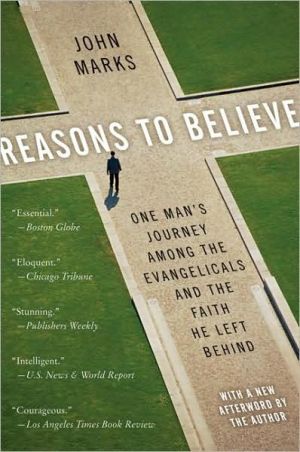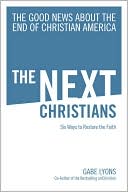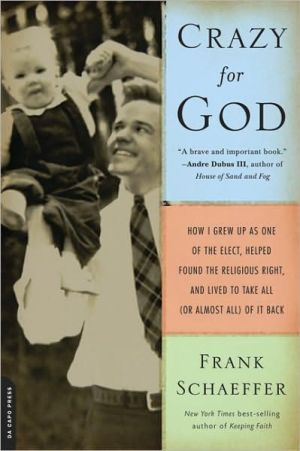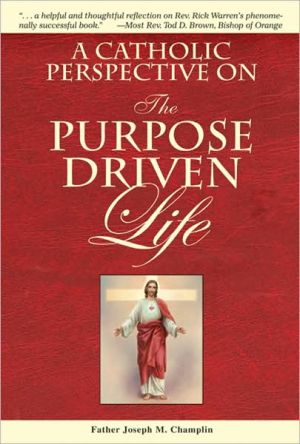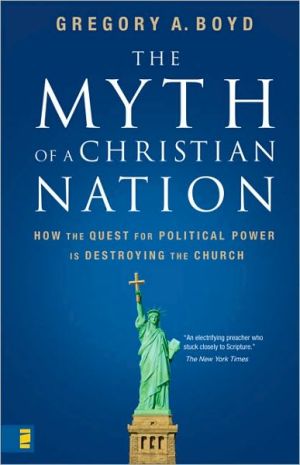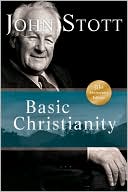Reasons to Believe: One Man's Journey Among the Evangelicals and the Faith He Left Behind
Born again at sixteen, John Marks later abandoned his faith. In Reasons to Believe he attempts to cross a deep cultural barrier to understand those who now condemn his way of life. He speaks at length with missionaries, political activists, theologians—the rich and powerful, the poor and broken, and the pastors who have turned small congregations into megachurches. The result is a remarkable, intimate portrait of evan-gelicals, one of the most influential forces in America today, and the...
Search in google:
Born again at sixteen, John Marks later abandoned his faith. In Reasons to Believe he attempts to cross a deep cultural barrier to understand those who now condemn his way of life. He speaks at length with missionaries, political activists, theologians the rich and powerful, the poor and broken, and the pastors who have turned small congregations into megachurches. The result is a remarkable, intimate portrait of evan-gelicals, one of the most influential forces in America today, and the unforgettable story of how a lapsed believer came to terms with his faith. Publishers Weekly Marks's first work of nonfiction began as a segment that he produced for 60 Minuteson the Left Behind phenomenon. During the research, a devout evangelical Christian couple made a deep impression on him, leaving him with the question of whether he would be left behind when Christ returns on judgment day. The problem gnawed at him. After getting laid off from 60 Minutes, the novelist (The Wall; War Torn) embarked on a two-year quest to uncover the wellsprings of America's most popular religion. While this memoir of longing and doubt treads some of the same territory explored by atheists such as Sam Harris, it is the first that doesn't simply reject the evangelical worldview. Marks discovers much that is positive, especially in the way churches rallied to aid victims of Hurricane Katrina. What makes this book most compelling, however, are the ways in which Marks allows his interviewees to engage him as a potential convert. He is so sympathetic to them that until the very last page it is uncertain whether he will decide to abandon his secular life. In the end, Marks gives us a stunning glimpse of American evangelicalism in all its variety. (Feb.)Copyright 2007 Reed Business Information
Reasons to Believe\ One Man's Journey Among the Evangelicals and the Faith He Left Behind \ Chapter One\ First Things\ In the fall of 2003, on assignment for the CBS news show 60 Minutes, I went home to Dallas, Texas, in search of interview candidates for a segment on evangelical Christians. I made the decision casually. My hometown had more than its share of evangelicals. I didn't expect to find a lost piece of myself there.\ As a producer for Morley Safer, I had begun work on a story about a series of novels inspired by the Christian version of the end of the world, and one of the authors, the Reverend Tim LaHaye, had agreed to appear at a Prophecy Conference in the Dallas suburb of Garland. For the story, I wanted to find fans of the books who could talk with enthusiasm about what the novels had meant to them—the assumption being that these books, unlike most popular fiction, had an appeal that went well beyond entertainment.\ Pastors at several churches gave me names and phone numbers. I found Don and Lillie McWhinney through a church in Denton, Texas, and they agreed to meet me for lunch at a prime rib restaurant among a twist of freeways and toll roads in north Dallas. At the time, I had no earthly idea how important they would become to me, or this book, but I was struck by their presence immediately. Don, a former oil executive, had dressed in a dark blue business suit, Lillie in a beige pantsuit. They were both trim, good-looking people. Don had the bigger personality. A man in his midsixties, with snow white hair and beetling white eyebrows, with a sonorous voice to match, Don looked and sounded like a localanchorman. He often began a thought with my first name, "You see, John," and when the words came out of his mouth, they had a stylized flair. They sounded like scripted lines. Don told me that he often worked as a chaplain in the Dallas area, making visits to corporate offices and patients in hospice care, and it made sense. You could hear him delivering an impromptu message in an elevator, at the water cooler, in a cubicle during lunch hour, or in the afternoon quiet of a house where someone slowly passed away. When he stopped talking, the silence dropped like a barbell.\ Lillie, a small, attractive woman in her fifties, with big eyes and a sly smile, was less imposing. She wasn't at all shy, but her manner and physical presence conveyed a certain fragility that seemed, at first, to be at odds with her robust sense of spiritual urgency. She listened closely to Don and never interrupted, but he would often turn to her and say, "Lillie, tell him what you told me just the other day."\ The McWhinneys ordered the prime rib, and for an hour I quizzed them about their faith. The lunch was an audition. I asked them if they liked the Left Behind books, and Don praised them. The Left Behind books were works of history, he maintained, set in the future rather than the past, and he compared them to fictionalized accounts of the story of the Titanic. Lillie liked them too, but Don was the enthusiast. They both believed that events recounted in the novels would one day come to pass. They believed in the Rapture, when Jesus would come and spirit away his people. They believed in the Tribulation, when God would allow the Antichrist to govern those people on earth who had been left behind. And they certainly believed in God's final retribution, when all nonbelievers would be destroyed. Lillie said that she sometimes liked to imagine what the Rapture would feel like; she gazed at the sky above her backyard and imagined some mundane morning when she would look out of her kitchen window and see spirits flying beyond the roofs of homes into the sunlight. And yet, as Don and Lillie described the historical inevitability of the annihilation of most of the human race, they did so without the slightest trace of malevolence. They were almost sweet about it. By the end of an hour, I had decided that Don McWhinney would make an ideal interview candidate.\ Typically, the meeting would have ended there, but just as the couple were finishing their meals, it became clear that Don had something else on his mind. He peered at me across the table. I was struck again by those looks. With those bushy white eyebrows, with his blue eyes and snowy hair, he seemed the Hollywood ideal of benevolent goodness come to life. When God called, Don McWhinney would go to heaven, and the belief had transformed his very flesh.\ "You've asked us a lot of questions," Don said. I nodded. "May I ask you a question?" A stillness settled on the table. I knew what was coming. Lillie watched my face. I braced for it.\ "Will you be left behind?"\ would i be left behind? In other words, had I been saved by the grace of Jesus Christ? Or would I be left to face the torments of hell, or the violence of hell on earth, should the end come during my lifetime? It struck me as the most remarkable question imaginable, and at the same time, maybe the most American. According to the preeminent pollster in the evangelical world, George Barna, the United States has more born-again Christians than any other country in the world, some 100 million people who are "assured of eternal salvation solely because they have confessed their sins and accepted Jesus Christ as their savior." And a majority of these believers told the pollster they had shared their faith with a non-Christian. They had posed the Don McWhinney question, in effect. The proper verb for that is "witness": to witness is to share or impart a sense of one's own faith to another. Scripture calls believers to do so as often as possible—to become a living witness to their . . .\ Reasons to Believe\ One Man's Journey Among the Evangelicals and the Faith He Left Behind. Copyright © by John Marks. Reprinted by permission of HarperCollins Publishers, Inc. All rights reserved. Available now wherever books are sold.
\ Brian McLaren"A penetrating view into what has been the dominant strain of Christian faith in America in recent decades."\ \ \ \ \ Darcey Steinke"Marks tracks his former born again faith with a ruthless critical eye."\ \ \ Bruce Feiler"Illuminates a world that most people think they know... will reshape your views of the future of faith."\ \ \ \ \ Los Angeles Times Book Review"Courageous investigative journalism...a memoir of startling self-reflection…Marks writes with unfailing intelligence, insight, and deep compassion."\ \ \ \ \ U.S. News & World Report"For an intelligent, first-person tour through the large American evangelical landscape, readers could not do much better than John Marks’s REASONS TO BELIEVE."\ \ \ \ \ Publishers WeeklyMarks's first work of nonfiction began as a segment that he produced for 60 Minuteson the Left Behind phenomenon. During the research, a devout evangelical Christian couple made a deep impression on him, leaving him with the question of whether he would be left behind when Christ returns on judgment day. The problem gnawed at him. After getting laid off from 60 Minutes, the novelist (The Wall; War Torn) embarked on a two-year quest to uncover the wellsprings of America's most popular religion. While this memoir of longing and doubt treads some of the same territory explored by atheists such as Sam Harris, it is the first that doesn't simply reject the evangelical worldview. Marks discovers much that is positive, especially in the way churches rallied to aid victims of Hurricane Katrina. What makes this book most compelling, however, are the ways in which Marks allows his interviewees to engage him as a potential convert. He is so sympathetic to them that until the very last page it is uncertain whether he will decide to abandon his secular life. In the end, Marks gives us a stunning glimpse of American evangelicalism in all its variety. (Feb.)\ Copyright 2007 Reed Business Information\ \ \ \ \ Kirkus ReviewsNovelist and former 60 Minutes producer Marks (Fangland, 2007, etc.) mingles personal reflections with a journalistic foray into evangelical America. The author logged a few intense teenage years as an evangelical before reading Enlightenment philosophy and moving on. Taking another look as an adult, he spotlights popular evangelical writers like Brennan Manning, sits through an endless sermon about salvation (if you don't know Jesus, you're sunk), examines hot-button issues and explores what evangelicals mean when they say they have a "personal" relationship with Jesus. Along the way, Marks makes many perceptive points. The term "fundamentalist" is falling out of fashion even among the most conservative Christians, he points out; they prefer the term "evangelical," mostly because they are trying to distance themselves from "Islamic fundamentalism." But the divide between evangelicals and the more defensive, antagonistic fundies still exists, avers the author, and over the next two decades it will become "far sharper, far deeper." Marks notes American evangelicals' obsession with C.S. Lewis, who lends some intellectual bona fides to evangelical preaching and teaching. Evangelicals feel that other Americans look down on them, he suggests; they are thrilled to meet "a nonbeliever who doesn't consider them de facto idiots or dullards." Occasionally, Marks strikes a false note. His mystifyingly out-of-date insistence that evangelicals still shun everything "worldly" fails to take into account the many ways in which today's evangelicals-as opposed to those of, say, the 1940s-ceaselessly strive to be relevant to, and partake freely of, American consumer culture. In a somewhat banal conclusionto his "journey," the author rejects evangelicalism because he can't believe a god could have presided over all the violence of the 20th century. Still, one of the more insightful recent books about evangelicalism. Agent: Joe Regal/Regal Literary\ \
